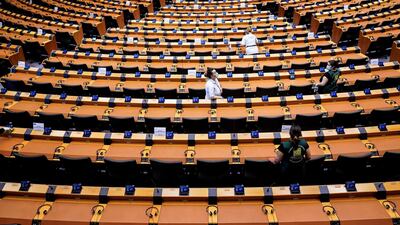The European Commission is unveiling a plan to borrow on the market and then disburse to EU member states €500 billion (Dh2 trillion) in grants and €250bn in loans to help them recover from a coronavirus slump, EU officials said.
The aim is also to protect the European Union's single market of 450 million people from being splintered by divergent economic growth and wealth levels as the 27-nation bloc emerges from its deepest-ever recession expected this year.
It is needed because countries such as Italy, Spain, Greece, France and Portugal, burdened with high debt and heavily reliant on tourism, will find it more difficult than more frugal northern nations to restart their economies through borrowing.
European Economy Commissioner Paolo Gentiloni said on Twitter that the total sum proposed for the recovery fund was €750bn.
Four EU officials and diplomats confirmed the split between grants and loans that the EU executive arm is due to announce today in the European Parliament, and one senior EU diplomat called the plan a "sensible" proposal.
The euro jumped to trade at $1.1022, up from $1.0932.
The recovery fund package is in addition to the EU's long-term budget for 2021-27, which the Commission will propose being set at €1.1tn, sources said.
The €500bn in grants is in line with the wishes of the EU's two biggest economies – France and Germany – though some nations would rather see the recovery package comprise only loans.
The package would also provide guarantees that could draw in many times more in private cash by reducing the risk of various investments.
But it is the grants, financed through joint borrowing, that worry the Netherlands, Sweden, Austria and Denmark. The borrowing will have to be repaid, meaning higher national contributions to the EU budget in the future or new taxes assigned to the EU.
The Commission is expected to propose new revenue streams. They are most likely to come from a tax on plastics, some money from the CO2 emissions trading scheme, a digital services tax, national corporate taxes and an import levy on goods produced in countries with lower CO2 emissions standards than the EU.
The Commission floated these ideas two years ago but failed to garner enough support among governments.
It also wants to phase out all rebates that various countries now enjoy on their contributions to the EU budget, to halve the amount of customs duties that governments keep and to have a bigger share of the Value Added Tax paid to the EU.

